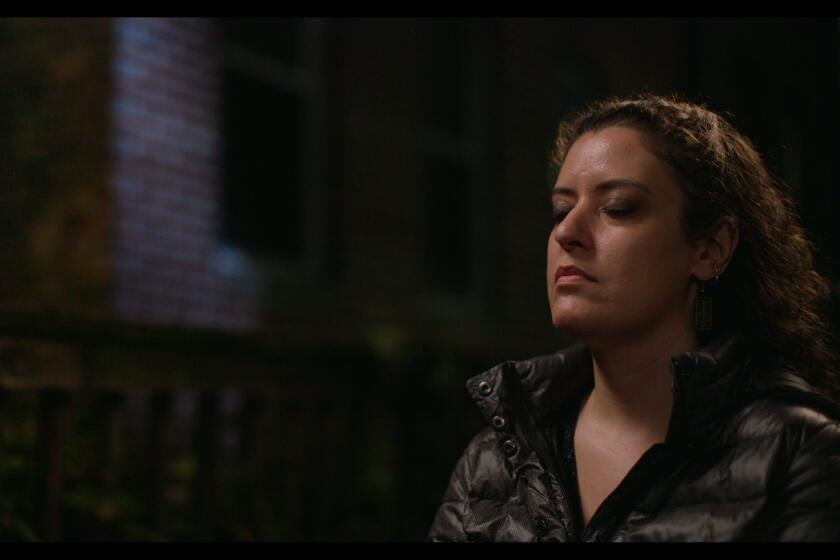MOVIE REVIEW : SPINNING A FINE WEB IN ‘SPIDER’
Over the first moments of “Kiss of the Spider Woman” (Bruin, Westwood) a man’s voice, thick with the intoxication of an inner vision, describes the plot of a ‘40s movie. And as he murmurs his story, he acts it out: twisting a towel around his hair he becomes its glamorous actress, “a cabaret star of the highest rank,” preparing to take her scented bath. In contrast to this delirious vision, so passionately described that the scent of gardenias seems to waft through the theater, the camera takes us slowly across the harsh vistas of a Latin American jail cell. The narrator is Luis Molina (William Hurt), a gentle homosexual in his late 30s, his long hair an odd orange-blond under its bath-towel turban. With his plucked eyebrows and smooth broad forehead, his face can at certain moments look like Carroll Baker’s, in other quick seconds like Peggy Ann Garner’s.
Argentine Molina is serving an eight-year jail sentence “for impairing the morals of a minor.” His not always-willing audience for these nightly recitations is the lean, black-bearded Valentin Arregui (Raul Julia), a Marxist political prisoner who has already been severely tortured.
This is director Hector Babenco and scenarist Leonard Schrader’s profoundly moving adaptation of Manuel Puig’s celebrated and idiosyncratic 1976 novel. For his rapturous characterization of Molina, a performance both generous and acute, with succeeding levels that reveal themselves as the story deepens, Hurt won Best Actor at Cannes this year. It may prove to have been only his first recognition for 1985.
Valentin is harshly contemptuous of Molina, not for his homosexuality but for his moist, uncritical acceptance of everything . The stage is set for these two utterly dissimilar men to discover the real lineaments of masculinity, friendship and courage.
In his book, Puig kept character descriptions skeletal; where he pulled out all the stops was in Molina’s hypnotic re-tellings of the films “he happened to be fond of,” such cult beauties as “The Cat People,” “The Enchanted Cottage” or “I Walked With a Zombie.”
And in the novel, through Molina’s shimmering recitations of his beloved movies, you began to understand how he structured his world (in which, by profession, he was a window dresser), and the grandly delusional part movies had in it. He created a place full of romance, gallantry and death for a cause. Naturally, it was also the antithesis of Valentin’s grimly real world, where death was only too imminent and unromantic.
Instead of scenes from these three movie classics, the film makers show us, in sepia, a purported Nazi propaganda opus, “Her Real Glory,” set in wartime France. Like Molina, we enter into it fully, as a way to get out of a claustrophobic prison. The film is an archly tragicomic story in which Sonia Braga slinks her way to a tragic end as a French heroine with a preference for a blond SS officer.
Here we get the real conflict with the spirit of Puig’s novel: This ersatz German film carries no emotional content for us, and nothing of the beauty or the intensity of “The Cat People” or the other two cult classics, either. Not their aura, their glorious play of light and shadow, nor their consummate style. “Her Real Glory” is made to be snickered at.
And in it, Braga is the least effective of any of the three roles she plays in “The Kiss of the Spider Woman.” The heavy makeup does her a disservice; she looks drawn, she moves inelegantly and she’s entirely the wrong type for the role. (It’s in her Spider Woman character later on that Braga shines.) What we lose is the voltage which Molina draws from his films: What we see of them makes his adulation seem pathetic, which is the last thing his character should be.
A reason for the clunkiness of “Her Real Glory” may be that Babenco’s artistry lies in an entirely different direction. His earlier film, “Pixote,” a real soul’s cry, was social realism at its finest. His sensibilities may just not lie in close-to-campy styles, even as an homage.
But not all audiences will be familiar with Puig’s novel and there is such fascination and artistry in the duet between Molina and Valentin that such matters as echt style may not matter a whit. “The Kiss of the Spider Woman” succeeds on a deep, emotional level and as spellbinding entertainment as well.
‘THE KISS OF THE SPIDER WOMAN’
An Island Alive Release of an H.B. Filmes Production (Sao Paulo) in association with Sugarloaf Films (Los Angeles). Producer David Weisman. Executive producer Francisco Ramalho Jr. Director Hector Babenco. Screenplay Leonard Schrader based on the novel by Manuel Puig. Editor Mauro Alice. Music John Neschling in association with Nando Carneiro. Additional score by Wally Badarou. Camera Rodolfo Sanchez. Set designer Felipe Crescenti. Art director Clovis Bueno. Costumes Patricio Bisso. Associate producers Jane Holzer, Michael Maiello, Studio Artes Visuais, Jayme Sverner, Cena Filmes, Gustavo Halbreich, Altamiro Boscoli, Paulo Francini. With William Hurt, Raul Julia, Sonia Braga, Jose Lewgoy, Milton Goncalves, Fernando Torres.
Running time: 1 hour, 59 minutes.
MPAA-rated: R (persons under 17 must be accompanied by parent or adult guardian).
More to Read
Only good movies
Get the Indie Focus newsletter, Mark Olsen's weekly guide to the world of cinema.
You may occasionally receive promotional content from the Los Angeles Times.







